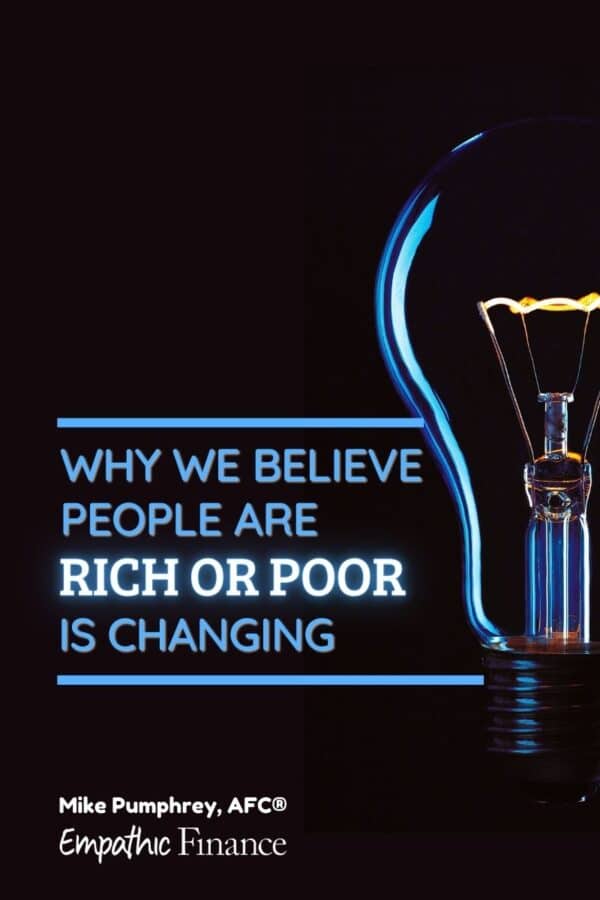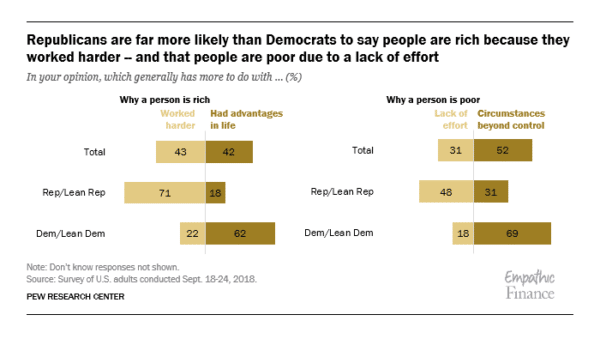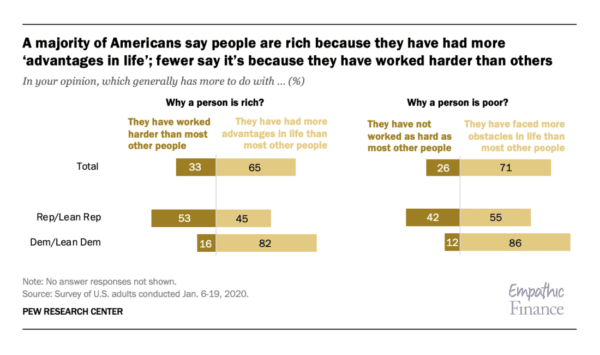I look at three studies by the Pew Research Center on how our beliefs on why people are rich or poor are evolving, and in a promising way.
I know in my heart of hearts that the vast majority of people who may be considered poor aren’t that way because they are somehow lazy or deficient.
They may be poor due to bad decisions or mental health challenges (or both), but that seems hardly fair to put this on them.
In the same way, it’s similarly hard to believe that the people who are rich in our society became that way purely through hard work, and being better/smarter than everyone else. I’m sure there’s a lot of hard work in there, but there simply must be a little bit of kismet too: meeting the right person at the right time, having the right skills applied in the most lucrative area.
And of course, it really helps if you’re white and male.
Nevertheless, these beliefs on whether people are economically advantaged or disadvantaged due to their own doing is, unfortunately, a very political statement. The data bears this out.
And it’s that very data that I want to talk about today. Because I recently read some very eye-opening research on this very topic that shows that (unsurprisingly) whether you think people being in poverty is “their fault” falls neatly along political lines.
But also, that these lines may be shifting, and in a positive way.

Table of Contents
Pew Research Center
The Pew Research Center is a think tank. By their own words:
Pew Research Center is a nonpartisan fact tank that informs the public about the issues, attitudes and trends shaping the world. We conduct public opinion polling, demographic research, content analysis and other data-driven social science research. We do not take policy positions.
When you hear news reports citing political studies, Pew Research Center is one of those groups that are actually doing the research and presenting the results.
I did some reading on their site recently, and found a number of reports that talk about the question of why people think other people are rich or poor, that I thought was very interesting.
There were three related studies, done in 2017, 2018, and 2020. Taken together, they chart a sort of progress, and are certainly more interesting when taken as a whole.
2017 survey
The title is simple: “Why people are rich and poor: Republicans and Democrats have very different views“
Here is the summation of their findings:
Most Republicans link a person’s financial standing to their own hard work – or the lack of it. Most Democrats say that whether someone is rich or poor is more attributable to circumstances beyond their control.
And the infographic here is most telling:

And there you have the partisan divide in life philosophy, laid bare. You can infer so many things from this one graphic: policy positions, personal empathy, you name it.
The question that comes to mind, of course, is correlation or causation. Is the belief that the rich succeed because they worked hard a consequence of being a Republican, or is being a Republican a consequence of having the belief that the rich succeed because they worked hard? And so on down the line.

2018 survey
A similar study was conducted the following year. And it shows a small but perceptible shift in the responses.
The title of this survey was: Partisans are divided over the fairness of the U.S. economy – and why people are rich or poor
And here’s the updated graphic.

Note the differences between the two graphics. In almost every case, the numbers on the light colored charts (denoting that the rich work harder, and the poor lack effort) went down, while the numbers of the dark colored charts (denoting that the rich had advantages and the poor have circumstance beyond their control) went up.
I can’t determine what explains this shift, or even if it’s statistically significant. But it’s notable.
2020 survey
Finally, in probably their last pre-pandemic study, they repeated this in 2020. And once again, there’s a continual shift.
Title: Most Americans Point to Circumstances, Not Work Ethic, for Why People Are Rich or Poor

Once again, in every case, the same movement happened, toward a belief that the rich had advantages, and the poor faced more obstacles.
My take
From these studies, it certainly seems like attitudes appear to be shifting towards the more compassionate angle, that the poor people had bigger challenges, and that rich people had advantages.
That’s certainly comforting to me, as a more empathic viewpoint is what I think our society is most needing.
But why might this be happening?
What happened in 2017-2020 to make people start to think that becoming wealthy might not be just because people worked harder? Is it because people themselves have been working their tails off, but not getting ahead?
And what happened in 2017-2020 to make people start to think that being poor isn’t a result of lack of effort? Could it be because we now know too many people who are poor but are as hard of a worker as anyone we’ve known?
As time goes on, and late-stage capitalism takes hold, what we’re finding is that fewer people are getting ahead, but the few that are succeeding are doing so on a scale so much more than ever before.
Forget about the old 99% adage. It certainly seems like the new phrase is “we are the 99.99%”.
Our society does not allow for upward mobility nearly as much as it used to. Wages are stagnant, costs are rising. These are facts, not policy positions.
Maybe we’re starting to realize that we’re not temporarily embarrassed millionaires, and the rest of us aren’t just riff-raff that aren’t deserving of our compassion? Maybe we’re starting to realize that we’re all in this together, working just about as hard as we can, and sometimes getting very different results.
Come on Pew, time to do another survey. A lot has happened since January 2020.
What do you think of these surveys?

